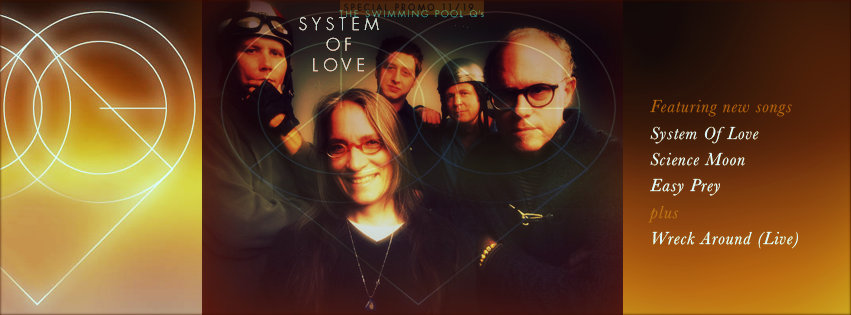System of Love EP by The Swimming Pool Q's- MP3 Album
Deep End Press > Free Times (1)
-
Free Times
Free Times
Columbia, South Carolina
Back In The Pool
The Swimming Pool Q’s Go
Off The Deep End Again
by Kevin Oliver
Atlanta's Swimming Pool Q's are back in the spotlight this year, touring behind the recent reissue of their 1981 debut album, The Deep End , but don't call this a comeback or reunion tour, because they never actually went away.
"We may have had a low profile over the last 10 years, but we have never disbanded or 'broken up' which is a perfectly understandable misapprehension," says singer/guitarist Jeff Calder. "We have continued to perform live, but since those opportunities were limited in the 1990's to some degree, we spent most of the decade creating a new collection of songs to be released within the next year under the title Royal Academy of Reality."
New music from the Q's is welcome news to the band's many fans. Back in the 1980's, when the Q's were in their prime, they recorded and released four albums and an EP full of immensely goofy yet insanely catchy, melodic rock and roll. The original lineup, which is still almost completely intact, included not only the eccentric Calder, but also a balancing vocalist in the sweetly strong-voiced Anne Richmond-Boston and some serious musical muscle via versatile guitarist Bob Elsey.
"That part of the group is the same as it was in 1982 and throughout our A&M releases," Calder says, "Our bassist is Tim DeLaney, who also plays with the Atlanta group the The Sight-seers."
Right now, the Q's have a dual focus, first on publicizing the Deep End reissue, then on promoting the upcoming new album. For the current tour, Calder says, they'll be performing songs from their entire repertoire, including tracks from The Deep End years, and the 1980's A&M recordings, and some of the yet-to-be-released material from the new album.
"It's a very elaborate disc on which the band is supplemented by as many as 30 additional musicians, including Moe Tucker of the Velvet Underground, the late drummer Samurai Celestial of the late Sun Ra and Brendan O'Brien, the successful rock producer (Train, Stone Temple Pilots, Pearl Jam, Korn) who also helped to fund its completion." That process has taken four long years to come to fruition, but Calder says the band has its reasons.
"A project like this is difficult to realize quickly without lots of bread, which seems to have always been concealed from us by gnomes."
It is important to note how unusual the Swimming Pool Q's were for the Southeast in 1982. Remember that contemporaries like R.E.M. and the B-52's were just getting started, too, and the music fans of the region were used to a steady diet of Southern rock. The Q's, by sheer force of personality, took their place in the newly emerging cadre of bands riding the punk and new wave sounds of the bigger markets, but they put their own unique stamp on the blueprints laid
down by Talking Heads, Blondie, and others, creating a lasting legacy and earning the longstanding devotion of a small legion of fans."The Q's percolated slowly in the Southern pop underground, which, I am happy to boast, we helped to create beginning in the late 1970's," Calder says. "I think that our audience developed with us over a long period of time. This may account for that enduring bond. In other words, perhaps they identify us with something more than simply nostalgia, something more like an unfolding 'idea.' We would hope so, anyway."
It wasn't easy being a weird pop band back in the early days, Calder admits. "We had to develop a strong presentation as a defense against the initial regional hostility to new wave and punk that we encountered," he says. "Maybe that level of confidence made a lasting impression on listeners, even if they didn't appreciate what we were trying to do at first. Additionally, though it's easy to identify The Q's with this or that historical phase, we were determined to stand outside of immediate fads."
Who can forget the constantly emerging and receding subgenres that existed even then? Calder hasn't, and he remembers one in particular. "You have no idea how many times during The Deep End Years, say 1980, that it was suggested we'go rockabilly.' Why didn't we listen?"
In retrospect, it is fortunate that the band did not listen either to well-meaning advisors or shortsighted detractors, but instead forged their own path through the music business. Listening to an album like The Deep End 20 years later and enjoying it as much as the first time is proof enough of that.






